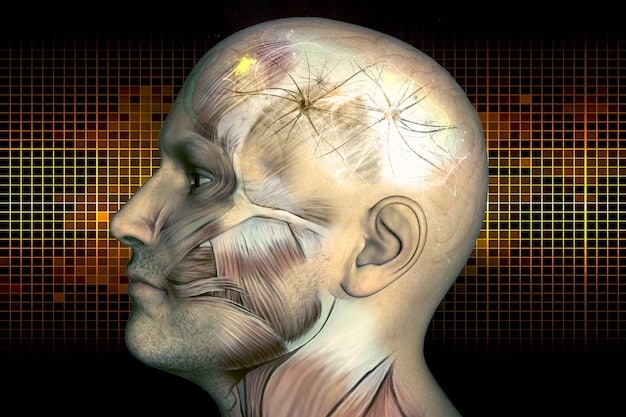The Science of Gratitude: 21 Days to a Better You

The Science of Gratitude: How a 21-Day Practice Can Improve Your Mental Well-being explores the neurological and psychological benefits of gratitude, demonstrating how a structured gratitude practice can lead to significant improvements in mental health and overall well-being.
Unlock the transformative power of thankfulness with a 21-day gratitude challenge. Discover The Science of Gratitude: How a 21-Day Practice Can Improve Your Mental Well-being through a science-backed approach to cultivating happiness.
Understanding the Neuroscience of Gratitude
Gratitude, often described as a positive emotion, has profound effects on the brain. By understanding the underlying neuroscience, we can better appreciate the potential benefits of cultivating gratitude.
How Gratitude Rewires the Brain
Studies utilizing neuroimaging techniques like fMRI have shown that gratitude activates specific regions of the brain associated with reward, positive emotion, and social bonding. Regular practice can strengthen these neural pathways, making gratitude a more automatic response.
Gratitude stimulates the release of dopamine and serotonin, neurotransmitters responsible for feelings of happiness and well-being. This natural boost can improve mood and reduce symptoms of depression and anxiety.
Key Brain Regions Involved
Several key brain regions are particularly active when experiencing and expressing gratitude:
- Prefrontal Cortex: Involved in decision-making and emotional regulation, it helps in consciously appreciating positive aspects of life.
- Anterior Cingulate Cortex (ACC): Plays a role in emotional and cognitive processing, linking actions with positive outcomes.
- Amygdala: Processes emotions; gratitude can help reduce activity in the amygdala, lowering feelings of fear and anxiety.

In essence, gratitude is not just a fleeting emotion but a complex neurological process that can be nurtured through consistent practice. By understanding how it rewires the brain, individuals can harness its power to improve mental well-being.
The Psychological Benefits of a Gratitude Practice
Beyond the neurological effects, practicing gratitude offers significant psychological benefits. These benefits range from improved emotional regulation to enhanced relationships.
Improved Emotional Well-being
Gratitude is strongly linked to increased happiness and life satisfaction. Regularly acknowledging positive aspects of life can shift focus away from negative emotions, fostering a more positive outlook.
Gratitude helps reduce feelings of envy and resentment. By appreciating what one has, individuals are less likely to dwell on what they lack, leading to greater emotional contentment.
Enhancing Social Connections
Gratitude fosters stronger social bonds. Expressing appreciation can deepen relationships, improve communication, and increase feelings of social support.
- Improved Relationships: Expressing gratitude strengthens bonds and deepens connections.
- Increased Empathy: Recognizing the kindness of others fosters empathy.
- Enhanced Communication: Promotes positive interactions and reduces conflict.
Practicing gratitude can lead to profound changes in psychological well-being, making it an essential tool for mental health. Recognizing and appreciating the positive aspects of life fosters emotional resilience and deeper social connections.
Starting Your 21-Day Gratitude Journey
Embarking on a 21-day gratitude practice is a straightforward yet transformative process. With simple daily exercises, individuals can cultivate a mindset of appreciation and positivity.
Choosing a Gratitude Practice
Several methods can be incorporated into a daily routine. Selecting a practice that resonates personally ensures consistency and maximizes benefits.
Gratitude journaling involves writing down things one is grateful for each day. This helps in consciously focusing on positive aspects of life, reinforcing feelings of contentment and joy.
Setting Realistic Goals
Consistency is key. Aiming for small, achievable goals ensures long-term adherence to a gratitude practice.
- Write Daily: Dedicate a few minutes each day to writing down things you are grateful for.
- Be Specific: Focus on specific details rather than vague generalities.
- Reflect Regularly: Take time to reflect on the positive experiences and feelings.
Starting a 21-day gratitude journey involves choosing a suitable practice and setting achievable goals. With dedication, individuals can reap significant mental health benefits, cultivating a mindset of appreciation and positivity.
Tools and Techniques for Cultivating Gratitude
Several practical tools and techniques can facilitate the cultivation of gratitude. These methods can enhance the experience and deepen the impact of a gratitude practice.

Gratitude Journaling Apps
Numerous mobile apps offer structured gratitude prompts and reminders. These apps can help individuals stay consistent and focused on their gratitude practice.
Using apps can provide convenient ways to track and reflect on expressions of gratitude over time. Some apps also offer guided meditations and community features, enriching the overall experience.
Mindfulness Meditation and Gratitude
Combining mindfulness meditation with gratitude practices amplifies the benefits. Focusing on the present moment while expressing gratitude can deepen feelings of appreciation and joy.
Mindfulness meditation encourages awareness of thoughts and emotions without judgment, allowing for a deeper connection with positive experiences and feelings of gratitude.
By leveraging these tools and techniques, individuals can enrich their gratitude practice, amplifying its positive impact on mental well-being. From gratitude journaling apps to mindfulness meditation, these methods facilitate a deeper appreciation for the positive aspects of life.
Overcoming Challenges in Your Gratitude Practice
Even with the best intentions, challenges may arise during a gratitude practice. Addressing these obstacles proactively can ensure continued progress and maximize benefits.
Dealing with Negative Emotions
It’s normal to experience negative emotions even while practicing gratitude. Acknowledging and processing these feelings without judgment is essential.
Using gratitude as a coping mechanism during difficult times can help reframe perspectives and foster resilience. Focusing on what one has rather than what is lacking can mitigate feelings of sadness or anxiety.
Maintaining Consistency
Life can get busy, making it challenging to stick to a daily gratitude practice. Developing strategies to maintain consistency is crucial.
- Set Reminders: Use alarms or calendar alerts to prompt daily gratitude exercises.
- Incorporate into Routine: Link gratitude practice with an existing daily activity, such as brushing teeth or having morning coffee.
- Be Flexible: Adjust the method or timing of the practice to accommodate changing schedules.
By addressing potential challenges and implementing effective strategies, individuals can sustain their gratitude practice and continue to reap its mental health benefits. Recognizing that setbacks are normal and proactively working to overcome them fosters resilience and long-term adherence.
Sustaining Long-Term Gratitude for Continued Well-being
While a 21-day practice is a great start, turning gratitude into a sustainable lifestyle is key for continued well-being. Here’s how to make gratitude a permanent part of your life.
Integrating Gratitude into Daily Life
Making gratitude a natural part of daily interactions and routines ensures sustained benefits over time. Small acts of appreciation can have a significant impact.
Expressing gratitude to others, whether through words or actions, deepens relationships and fosters a positive social environment. Saying “thank you” and acknowledging the kindness of others creates a ripple effect of positivity.
Expanding Your Gratitude Perspectives
Continually seeking new aspects of life to be grateful for enhances the practice. Broadening perspectives ensures that gratitude remains fresh and impactful.
Exploring new experiences, learning new skills, and engaging in meaningful connections can uncover new sources of gratitude. These activities enrich life and foster a deeper appreciation for the world around us.
Integrating gratitude into daily life and continually expanding perspectives ensures sustained well-being over time. Cultivating a mindset of appreciation and positivity becomes second nature, enriching personal and social life.
| Key Aspect | Brief Description |
|---|---|
| 🧠 Neuroscience of Gratitude | Gratitude activates brain regions associated with reward and positive emotions. |
| 😊 Psychological Benefits | Improved emotional well-being and enhanced social connections. |
| ✍️ Gratitude Journaling | Writing down things one is grateful for daily. |
| 🌱 Maintaining Gratitude | Integrate gratitude into daily life for continued well-being. |
[Frequently Asked Questions]
▼
A gratitude practice involves intentionally focusing on and appreciating the positive aspects of your life. This can be done through journaling, meditation, or simply taking a few moments each day to reflect on what you’re thankful for.
▼
While individual experiences vary, many people report feeling noticeably happier and more content within just a few weeks of starting a regular gratitude practice. Consistency is key to experiencing lasting benefits.
▼
Yes, numerous studies suggest that practicing gratitude can significantly reduce symptoms of anxiety and depression. By shifting focus to positive aspects, it can help reframe negative thought patterns and improve overall mood.
▼
You can start by writing down three things you’re grateful for each morning, expressing appreciation to people you interact with, or simply taking a moment to acknowledge and appreciate the small joys in life.
▼
It’s okay to start small. Focus on the basics, such as good health, a roof over your head, or a supportive friend. Over time, you’ll likely find that more things come to mind as you train your brain to recognize the positive.
Conclusion
Embarking on a 21-day gratitude practice is a powerful step towards enhancing mental well-being. By understanding the science behind gratitude and incorporating simple daily exercises, individuals can cultivate a more positive mindset and reap lasting benefits for their emotional and psychological health.





